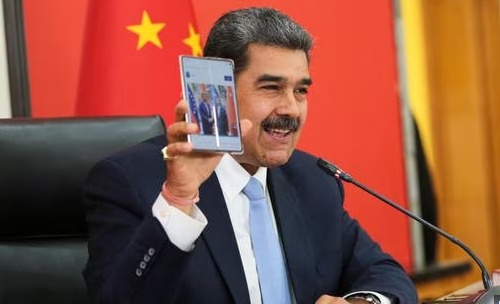Negotiations With China: Trump Administration's Focus On Tariffs And Rare Earths

Table of Contents
- The Tariff War: A Defining Feature of Trump's China Policy
- Imposition of Tariffs:
- Negotiating Leverage through Tariffs:
- Rare Earths: A Geopolitical Power Play
- Strategic Importance of Rare Earths:
- Diversification Efforts and Domestic Production:
- Overall Impact and Lasting Legacy of the Trump Administration's Approach
- Successes and Failures:
- Long-Term Implications for US-China Relations:
- Conclusion
The Tariff War: A Defining Feature of Trump's China Policy
The Trump administration's strategy towards China was largely defined by its imposition of tariffs. This "trade war," as it became known, involved multiple rounds of escalating tariffs on a wide range of Chinese goods.
Imposition of Tariffs:
The administration levied tariffs on various sectors, aiming to pressure China into concessions. This included:
- Section 301 tariffs: Initially targeting technology and intellectual property theft, these tariffs reached rates as high as 25% on hundreds of billions of dollars worth of goods.
- Steel and aluminum tariffs: These broader tariffs, impacting various industries, were justified on national security grounds.
- Retaliatory tariffs from China: China responded in kind, imposing its own tariffs on US goods, creating a cycle of escalating trade tensions.
The economic impact was significant. The tariffs led to:
- Increased prices for consumers: Tariffs on imported goods directly increased prices for consumers in the US.
- Supply chain disruptions: Businesses faced challenges sourcing goods, leading to production delays and increased costs.
- Job losses in some sectors: While some argued tariffs protected domestic industries, others experienced job losses due to reduced exports and market disruption. Precise figures on job losses are debated, with different studies yielding varying results.
Negotiating Leverage through Tariffs:
The Trump administration believed tariffs provided leverage to extract concessions from China, including:
- Enhanced intellectual property protection: The administration sought stronger safeguards for US companies' intellectual property in China.
- Reduction of the trade deficit: A core goal was to shrink the substantial US trade deficit with China.
- Fairer market access: The US aimed for increased access to the Chinese market for American businesses.
The effectiveness of this strategy is debated. While some trade deals were reached, the overall success in achieving these stated goals remains controversial. Many economists argue that the economic costs of the tariff war outweighed any benefits gained through concessions.
Rare Earths: A Geopolitical Power Play
Beyond tariffs, the Trump administration recognized the strategic importance of rare earths—essential minerals crucial for numerous high-tech applications.
Strategic Importance of Rare Earths:
Rare earths are vital components in:
- Smartphones and other consumer electronics: Their magnetic and luminescent properties are essential for various components.
- Electric vehicles: Rare earths are critical for electric vehicle motors and batteries.
- Military technology: They are crucial for guided missiles, radar systems, and other defense applications.
China's dominance in rare earth mining and processing presented a significant geopolitical concern. China controls a vast majority of the global rare earth supply chain.
Diversification Efforts and Domestic Production:
The Trump administration initiated efforts to diversify the rare earth supply chain and increase domestic production, including:
- Investment in domestic mining and processing: The government invested in research and development to bolster domestic rare earth production.
- Exploration of alternative sources: The US sought to establish partnerships with other countries to reduce reliance on China.
- Stockpiling of rare earths: Efforts were made to build strategic reserves of these crucial minerals.
While these initiatives aimed to reduce dependence on China, progress has been slow. Developing a robust, cost-competitive domestic rare earth industry presents significant technical and economic challenges.
Overall Impact and Lasting Legacy of the Trump Administration's Approach
The Trump administration's approach to negotiations with China had both successes and failures.
Successes and Failures:
Successes: The administration secured some concessions from China regarding intellectual property protection and increased market access in certain sectors. However, the overall economic impact of the tariffs and the gains achieved remain debated.
Failures: The tariff war led to increased trade tensions, significant economic uncertainty, and damaged the overall US-China relationship. The goal of substantially reducing the trade deficit remained largely unachieved.
Long-Term Implications for US-China Relations:
The Trump administration's policies have left a lasting impact, creating:
- Increased distrust: The trade war significantly eroded trust between the two nations.
- Shifting global alliances: Other countries were forced to choose sides, affecting global alliances.
- Changes in trade practices: The experience has spurred reconsideration of global supply chain vulnerabilities.
These factors complicate future negotiations and add uncertainty to the geopolitical landscape.
Conclusion
The Trump administration's focus on tariffs and rare earths fundamentally reshaped negotiations with China. While some concessions were secured, the overall economic and geopolitical costs remain substantial. The lasting impact on US-China relations is profound, creating a more complex and potentially unstable global trade environment. Further research into the intricate details of these policies, their economic consequences, and their ongoing influence on current China negotiations is crucial for understanding the future trajectory of this critical bilateral relationship. We encourage you to explore reputable sources like government reports, academic journals, and leading news organizations to gain a more comprehensive understanding of this complex issue.

 Actors And Writers Strike The Complete Impact On Hollywood
Actors And Writers Strike The Complete Impact On Hollywood
 Sigue El Partido Uruguay Vs Colombia Sub 20 En Vivo Minuto A Minuto
Sigue El Partido Uruguay Vs Colombia Sub 20 En Vivo Minuto A Minuto
 Golf News Mc Ilroy And Lowry To Play Zurich Classic Together
Golf News Mc Ilroy And Lowry To Play Zurich Classic Together
 Presidente De Uruguay Regala Tres Toros A Xi Jinping Viaje A China
Presidente De Uruguay Regala Tres Toros A Xi Jinping Viaje A China
 Thomas Mueller 25 Rokov V Bayerne Mnichov Koniec Ery
Thomas Mueller 25 Rokov V Bayerne Mnichov Koniec Ery
